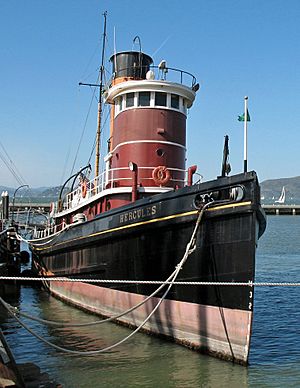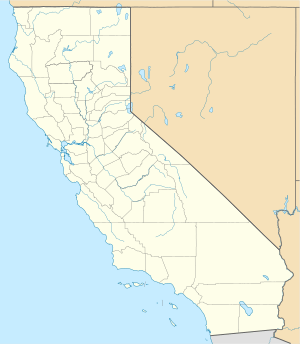Hercules (1907) facts for kids

Hercules at Hyde Street Pier, San Francisco Maritime National Historic Park
|
|
| History | |
|---|---|
| Owner |
|
| Builder | John H. Dialogue and Sons, Camden, New Jersey |
| Launched | 1907 |
| In service | 1907 |
| Out of service | 1962 |
| Identification | Official number: 20481 |
| Status | Museum ship |
| General characteristics | |
| Type | Tugboat |
| Tonnage | 409 GT |
| Length | 151 ft (46 m) LOA |
| Beam | 26 ft (7.9 m) |
| Draft |
|
| Propulsion |
|
| Speed | 10 knots (19 km/h; 12 mph) |
| Crew | 15 |
|
Hercules (tug)
|
|
| Location | San Francisco, California |
| Built | 1906 |
| Architect | John H. Dialogue and Sons |
| NRHP reference No. | 75000225 |
| Significant dates | |
| Added to NRHP | January 17, 1975 |
| Designated NHL | January 17, 1986 |
The Hercules is a powerful tugboat built in 1907. Today, you can visit her at the San Francisco Maritime National Historical Park in San Francisco, California. She is a special kind of museum ship, showing what life was like on a working steam tug.
Contents
The Mighty Hercules: A Tugboat's Story
Hercules was built in 1907 by a company called John H. Dialogue and Sons in Camden, New Jersey. She was made for the Shipowners' and Merchants' Tugboat Company in San Francisco. This company was famous for its "Red Stack Fleet" of tugboats. After she was finished, Hercules made a long journey to San Francisco. She sailed all the way around South America, through the Strait of Magellan, even towing her sister ship, Goliah, along the way!
Working Hard on the Ocean
For many years, Hercules was an "oceangoing" tug. This means she worked in the open ocean, not just in harbors.
- She often helped sailing ships by pulling them north along the coast from San Francisco. This was important because of the strong winds that often blew from the northwest.
- In 1916, for example, Hercules towed a famous sailing ship called the C.A. Thayer to Port Townsend, Washington.
- On her way back south, Hercules would often tow huge log rafts. These rafts were made of timber from the Pacific Northwest and were taken to mills in Southern California.
- She also towed large barges to other ports along the West Coast and even to Hawaii.
- Hercules even helped transport equipment for building the famous Panama Canal.
Switching Jobs: From Ocean to Bay
In 1924, the Western Pacific Railroad bought Hercules. Her job changed from ocean towing to working in San Francisco Bay. She began to shuttle huge railroad car floats across the bay. These floats carried train cars between Oakland, Alameda, and San Francisco. It was like a ferry for trains!
A Close Call with a Battleship
One of Hercules' most exciting moments happened in 1947. She and another tugboat, Monarch, were given a very important task. They had to tow the old battleship Oklahoma to San Francisco Bay. The Oklahoma was going to be taken apart for scrap metal.
But about 500 miles from Hawaii, a huge storm hit! The Oklahoma started to sink, and it looked like she might drag both tugs down with her. The Monarch managed to release her tow lines. Hercules struggled to get free, but at the very last moment, she broke loose. She narrowly avoided being pulled into the deep ocean by the sinking battleship!
After this adventure, Hercules went back to her job of shuttling train car floats. She continued this work until 1957. A newer, diesel-powered train ferry called Las Plumas replaced her. Hercules was kept ready as a backup until 1961.
Becoming a Museum Ship
In 1975, the California State Park Foundation bought Hercules. Then, in 1977, the National Park Service took over her care and began restoring her. Because of her important history, Hercules was named a National Historic Landmark in 1986.
Today, Hercules is one of the amazing exhibits at the San Francisco Maritime National Historical Park. You can find her docked at the park's Hyde Street Pier. She helps people learn about the history of tugboats and maritime life.
Did you know? The character named Hercules from the old TV show Tugs was actually based on this very vessel!
References
Images for kids
 | Bayard Rustin |
 | Jeannette Carter |
 | Jeremiah A. Brown |







